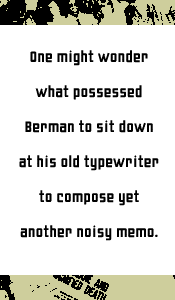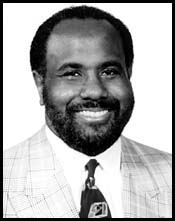|
For better or for worse, controversy sticks to Berman like lint.
At times he seems to attract it, perhaps thrive on it, if only
because he appears to have an unalterable inability to refrain from
airing his views. When the HCL administration floated a plan in 1996
to raise money by way of doubling fines on children's materials,
Berman's voice was the loudest in a choir of dissent; he was later
admonished for circulating a petition among staff that opposed the
policy.
 Two of
Berman's Sandynistas, Chris Dodge and Jan DeSirey, who co-edited
Everything You Always Wanted to Know About Sandy Berman but Were
Afraid to Ask, included in the 1995 festschrift an appendix of
his "rants"--letters to newspapers (to the Philadelphia
Inquirer in 1990: "I believe Walt Whitman to be the best damn
poet America ever produced. I also believe he was gay, and find no
contradiction nor cause for alarm in that."), elected officials (to
Minnesota representative Jim Ramstad the following year, concerning
the Gulf War: "I believe that you either do not truly comprehend
what has happened or, more charitably, have been misinformed"),
federal magistrates, Northern States Power, the New Yorker,
and the Hennepin County human resources department. Two of
Berman's Sandynistas, Chris Dodge and Jan DeSirey, who co-edited
Everything You Always Wanted to Know About Sandy Berman but Were
Afraid to Ask, included in the 1995 festschrift an appendix of
his "rants"--letters to newspapers (to the Philadelphia
Inquirer in 1990: "I believe Walt Whitman to be the best damn
poet America ever produced. I also believe he was gay, and find no
contradiction nor cause for alarm in that."), elected officials (to
Minnesota representative Jim Ramstad the following year, concerning
the Gulf War: "I believe that you either do not truly comprehend
what has happened or, more charitably, have been misinformed"),
federal magistrates, Northern States Power, the New Yorker,
and the Hennepin County human resources department.
Dodge's contribution to the volume, "Troubled Waters," noted that
Berman's career at Hennepin County had hardly been a smooth ride:
"Depending on which insider you talk to, his history there has been
either that of a problem employee or one who has spent a career
resisting administration-by-threat and draconian policy making."
Dodge pointed out several clashes between Berman and HCL management,
from bickering over his prolific and political mailing habits to
arguments about his 1990 letter, on HCL stationery, demanding the
recall of a book that claimed "AIDS is a form of self-punishment."
In the typewritten message, Berman called for an apology "to the gay
community and all persons with AIDS." Instead of getting that, he
wound up being verbally reprimanded by library administrators.
Last year, when HCL proposed its "Bestseller Express"--a program
whereby library users could "rent" new, high-demand titles by
authors such as John Grisham and Dean Koontz for $3 a week, as a
means of reducing long waiting lists--Berman railed against it as an
"elite, discriminatory service based entirely on a person's ability
to pay." Despite the opposition he rallied among the ranks,
"Bestseller Express" officially began on January 18, 1999; in
response to a staffwide e-mail about the launch, Berman fired off a
short reply, pointing out that the program was only "open" to those
who could afford it. The next day, Berman got a memo from HCL
director Charles Brown scolding him for broadcasting his views and
dubbing the e-mail "unnecessary and inappropriate." Brown then
requested that the head cataloger "please refrain from utilizing
this important library communications tool to broadcast your
personal perceptions and views."
Given that track record of headbutting and reprimands (he was,
all parties agree, already in hot water with the administration),
one might wonder what possessed Berman to sit down at his old
Remington that Monday morning in January to compose yet another
noisy memo--the one that, as it turned out, charted the collision
course that would lead to his resignation. One might wonder,
if they hadn't yet made the acquaintance of Sandy Berman.
The previous week, technical services assistant manager Elizabeth
Feinberg, one of Berman's supervisors, had sent out a memo about
HCL's transition to two standardized systems of cataloging: The
county system would become more reliant on something called the
Anglo-American Cataloging Rules, Second Edition (AACR2) guidelines.
It would also be joining the Online Computer Library Center Inc.
(OCLC) library network, which links more than 30,000 libraries in 65
nations, and functions as a massive database of nearly 42 million
records. As part of the overhaul project, HCL was to begin adopting
several standardized codes in the areas of grammar, abbreviations,
and headings that it had not used in the past. Attached to
Feinberg's memo was another, from Bill DeJohn and Carla Dewey of
MINITEX, the state-funded network of libraries, of which HCL is a
member.
In response Berman dashed off his offending memo, addressed to
DeJohn and Dewey, confirming that, yes, he was convinced that the
Hennepin County Library and AACR2 could collaborate on the
transition to an expanded cataloging system. But Berman, in
signature form, did not, or could not, stop there. He went on to
lament that AACR2 was not, in his judgment, in the habit of being
"user-friendly," that "School, public, and community library users,
in particular, were not well served by the AACR2 drafters. I invite
you & MINITEX to join me in a nearly 3-decade-long campaign to
genuinely make library catalogs more user-friendly & much less
elitist and mystifying." Berman signed off with his "warmest
regards," and copied the memo to Feinberg, technical services
manager Charles, and director Brown.

HCL director
Charles Brown admits that the outcry raised over Berman's
departure has been "almost beyond my comprehension"
Courtesy of Hennepin
County Library | Berman's
colleagues at MINITEX don't seem to have been offended by his
communiqué. As DeJohn recalls, "I just took it as a response from
Sandy on a memo I had sent Hennepin County. It was just a friendly
response to my note." Dewey says, "I received it as just a statement
of his position, some of his concerns about the widely accepted
standards. I didn't see it as contentious."
That view was not shared by Berman's supervisors. For writing and
sending the three-paragraph memo, Berman received a five-paragraph
written reprimand on February 8 from Brown and Feinberg, charging
that "Your active support of these changes is required. At this
time, your 'three-decade-long campaign' is extremely
counterproductive to the cataloging reengineering process, causes
divisiveness throughout the organization and presents an extremely
poor image to colleagues who are working with HCL." Beyond the
cataloging issue itself, the censure clearly suggested irritation
that Berman had deigned to air his thoughts on the issue, as he had
so often before. The letter warned that "further counterproductive
behavior" would be considered "insubordination and be cause for
further discipline." Attached was a copy of the Hennepin County
Human Resources Rules of Conduct.
Berman immediately sought to have the reprimand withdrawn. He
fired back a letter in which he argued that he was not opposed to
the new programs, but that he simply wanted to engage in some
serious discussion about the best way to go about putting them into
practice. In a memo back to Berman on February 22, Brown made it
clear that the reprimand would not be retracted.
It was at this juncture that Berman, by his own admission, "went
public" with the dispute and began drumming up support by
circulating copies of the relevant paperwork to his many friends and
colleagues. Many of those who received Berman's salvos began writing
indignant letters and petitions on his behalf, and the mail poured
into Brown's office.
The editors of the national trade magazine Library Journal
led the charge, sarcastically awarding "The Staff Morale & Unity
Award" to Brown and Feinberg for their treatment of Berman. The same
April 1 issue featured an article, "Hennepin County Rebukes Berman,"
that reverently summed up the head cataloger's status in a single
word: "legendary." Berman's longtime friend Al Kagan, with the
African Studies Library at the University of Illinois, added his
voice to the dissent: "Berman is almost like a cataloging guru. The
Hennepin County Library is known nationwide because Sandy is
there--not for another reason, but because of Sandy. He is the
library's claim to fame." Kagan let it be known that he considered
the HCL management's handling of the conflict nothing short of a
"travesty."
«PREVIOUS
PAGE ||
NEXT
PAGE»
|1
|2
|3
|4
|5
|6
|
|